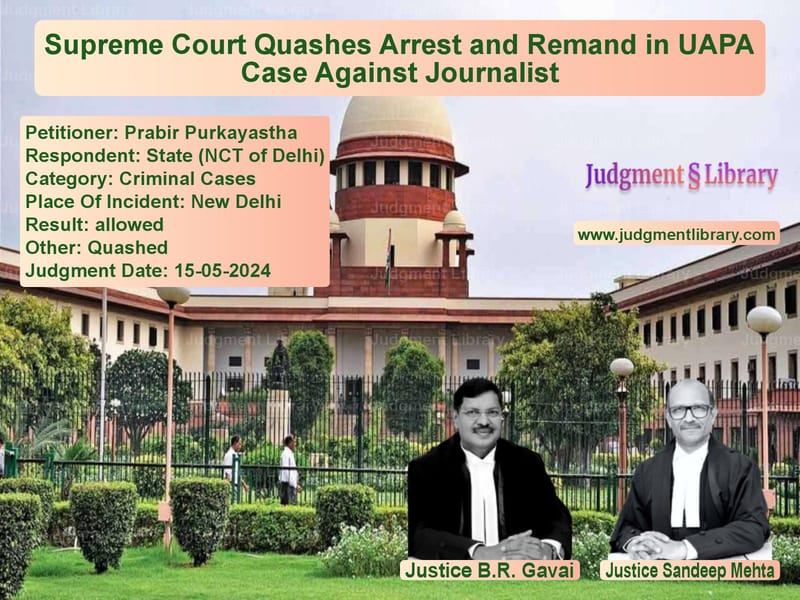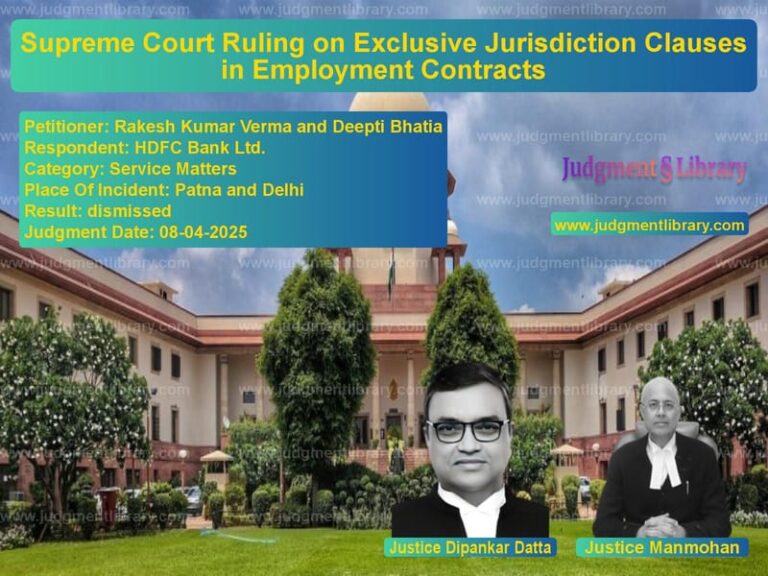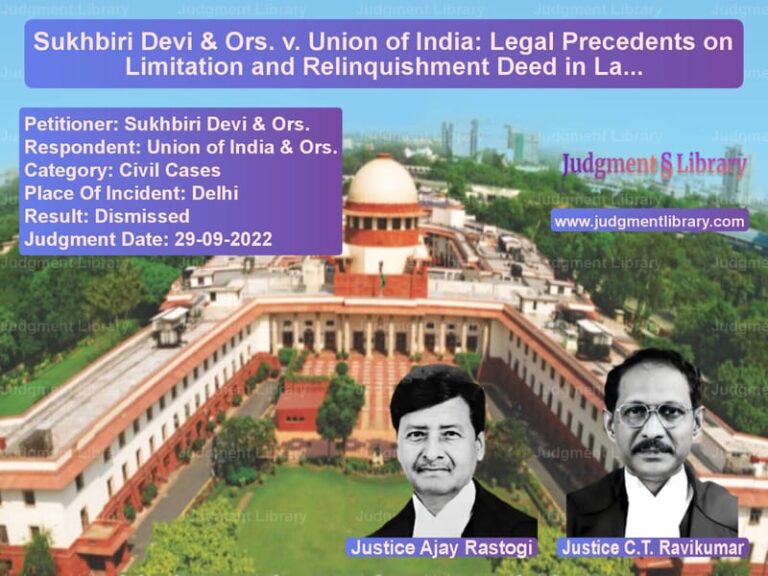Supreme Court Quashes Arrest and Remand in UAPA Case Against Journalist
The case of Prabir Purkayastha vs. State (NCT of Delhi) is a landmark judgment where the Supreme Court quashed the arrest and remand of the appellant, a journalist and director of Newsclick, under the Unlawful Activities (Prevention) Act (UAPA). The Court ruled that the arrest violated constitutional protections as the accused was not informed of the grounds of arrest in writing, thereby breaching Article 22(1) of the Constitution. The judgment, delivered on May 15, 2024, underscores the importance of procedural safeguards in criminal cases, especially those involving stringent anti-terror laws.
Background of the Case
The appellant, Prabir Purkayastha, is the Director of PPK Newsclick Studio Pvt. Ltd. He was arrested in connection with FIR No. 224 of 2023, registered on August 17, 2023, at the Special Cell, Lodhi Colony, New Delhi, under Sections 13, 16, 17, 18, and 22C of the UAPA, along with Sections 153A and 120B of the Indian Penal Code (IPC). The FIR alleged that the appellant was involved in unlawful activities that posed a threat to national security.
On October 3, 2023, the police arrested Prabir Purkayastha and seized various digital devices and documents from his residence and office. The next day, he was presented before the Additional Sessions Judge, Patiala House Courts, and remanded to seven days of police custody. The appellant challenged his arrest and remand before the Delhi High Court, which dismissed his plea on October 13, 2023. Subsequently, he filed a special leave petition before the Supreme Court.
Read also: https://judgmentlibrary.com/supreme-court-quashes-criminal-proceedings-in-kerala-bigamy-case/
Arguments by the Petitioner (Prabir Purkayastha)
Senior Advocate Kapil Sibal, representing the appellant, raised the following arguments:
- The arrest was illegal as the grounds of arrest were not provided in writing, violating Article 22(1) of the Constitution.
- The FIR was based on speculative and unverified allegations without substantial evidence.
- The arrest and remand were conducted in a clandestine manner to deprive the appellant of his right to legal representation.
- The appellant’s lawyer was not informed in time, and the remand order was passed before 6:00 AM, making it impossible for the defense counsel to oppose the custody.
- The appellant had protection in an earlier case related to foreign direct investment (FDI) violations, and the new FIR was an attempt to circumvent judicial protection granted in that matter.
Arguments by the Respondents (State of Delhi)
Additional Solicitor General Suryaprakash V. Raju, appearing for the State, countered:
- The appellant was informed of the grounds of arrest orally, and the remand order was passed in compliance with the law.
- The case involved serious national security concerns, justifying the stringent application of UAPA provisions.
- The Supreme Court’s ruling in Pankaj Bansal v. Union of India (2023) regarding the requirement of written grounds of arrest was delivered after the appellant’s remand and, therefore, did not apply retrospectively.
- The appellant had ample opportunity to consult with his legal counsel, and the remand order recorded that the lawyer was heard.
Supreme Court’s Observations
1. Violation of Article 22(1) and Legal Rights
The Court found that the appellant was not given written grounds of arrest, which violated constitutional protections:
“The right to be informed of the grounds of arrest in writing is a fundamental safeguard to prevent arbitrary state action. The failure to provide this in writing renders the arrest unconstitutional.”
2. Improper Conduct of Remand Proceedings
The Court was highly critical of the manner in which the remand was granted:
“The appellant was presented before the Remand Judge in the early hours of the morning, and his lawyer was informed after the remand order had already been passed. This violates the right to legal representation and procedural fairness.”
3. Retrospective Applicability of Legal Precedents
The Court rejected the government’s argument that Pankaj Bansal should not apply:
“Once the Supreme Court has clarified the law, it applies universally. The requirement to furnish written grounds of arrest is not a new principle but a fundamental right under Article 22(1).”
4. Abuse of Power and Malafide Intent
The Court noted that the State’s conduct raised concerns of bias:
“The manner in which the appellant was arrested and remanded suggests a deliberate attempt to subvert due process. Courts cannot allow investigative agencies to manipulate procedural safeguards.”
Key Findings and Judgment
The Supreme Court ruled in favor of the appellant and made the following key findings:
- The arrest and remand were illegal as they violated Article 22(1).
- The failure to provide written grounds of arrest nullified the entire process.
- The remand order was passed in an improper manner and could not be sustained.
- The appellant should be released immediately on bail, subject to conditions set by the trial court.
The Court ordered:
“The arrest of the appellant followed by the remand order dated 4th October, 2023, and the order passed by the High Court of Delhi dated 13th October, 2023, are hereby quashed. The appellant shall be released forthwith upon furnishing bail to the satisfaction of the trial court.”
Implications of the Judgment
This ruling has far-reaching implications:
- Strengthening Procedural Safeguards: Law enforcement agencies must provide written grounds of arrest to prevent arbitrary detention.
- Judicial Oversight on UAPA Cases: Courts will scrutinize cases under UAPA to ensure fundamental rights are protected.
- Fair Trial and Legal Representation: The judgment reinforces the right to legal counsel and a fair hearing.
- Check on Police Powers: The decision serves as a warning against procedural manipulations by investigative agencies.
Conclusion
The Supreme Court’s decision in Prabir Purkayastha vs. State (NCT of Delhi) is a landmark ruling that reaffirms the importance of procedural fairness in criminal law. By striking down the arrest and remand, the Court has sent a strong message that constitutional rights cannot be ignored, even in cases involving stringent anti-terror laws like UAPA. The ruling ensures that no individual can be deprived of liberty without strict adherence to due process.
Read also: https://judgmentlibrary.com/supreme-court-quashes-criminal-case-in-tamil-nadu-land-fraud-dispute/
Petitioner Name: Prabir Purkayastha.Respondent Name: State (NCT of Delhi).Judgment By: Justice B.R. Gavai, Justice Sandeep Mehta.Place Of Incident: New Delhi.Judgment Date: 15-05-2024.
Don’t miss out on the full details! Download the complete judgment in PDF format below and gain valuable insights instantly!
Download Judgment: prabir-purkayastha-vs-state-(nct-of-delhi)-supreme-court-of-india-judgment-dated-15-05-2024.pdf
Directly Download Judgment: Directly download this Judgment
See all petitions in Bail and Anticipatory Bail
See all petitions in Custodial Deaths and Police Misconduct
See all petitions in Extortion and Blackmail
See all petitions in Judgment by B R Gavai
See all petitions in Judgment by Sandeep Mehta
See all petitions in allowed
See all petitions in Quashed
See all petitions in supreme court of India judgments May 2024
See all petitions in 2024 judgments
See all posts in Criminal Cases Category
See all allowed petitions in Criminal Cases Category
See all Dismissed petitions in Criminal Cases Category
See all partially allowed petitions in Criminal Cases Category






